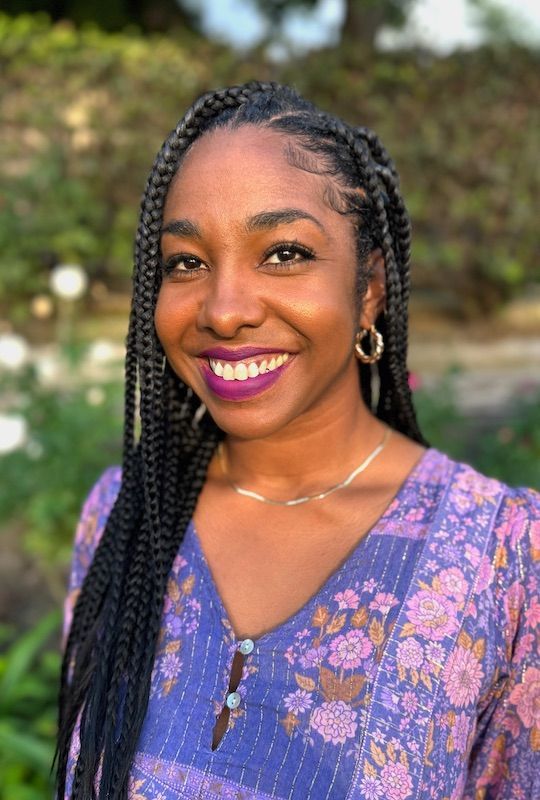The Role of Justice in Promoting Black Breastfeeding

I’m a 38-year-old Black woman, weeks away from giving birth to my third child, which will be the sixth in our blended family. My partner, Dr. Tre Watkins, is a professor and social justice scholar whose influence has shaped my perspective on lactation through a social justice lens. As a soon-to-be breastfeeding mother again, ten years after weening, I see how much work is still needed despite progress. I’m eager to breastfeed our new baby and want others to enjoy their feeding experience too.
As the second Black IBCLC with a solo private practice in San Diego, Melanin Milk SD, I’m dedicated to serving BIPOC and low-income communities with free and low-cost lactation consults via funding from a local breastfeeding nonprofit, SDBCF, along with my private pay and insurance clients. My work allows me to confront disparities head-on, informed by both my lived experience and the experiences of the diverse families I support.
The theme for this year is “Listen Up! Reclaiming Our Narrative & Centering Our Stories for Breastfeeding Justice”. The intersection of social justice and Black breastfeeding is crucial. Black women in the U.S. face unique challenges in breastfeeding due to systemic racism, healthcare disparities, and a lack of culturally congruent support. These factors contribute to lower breastfeeding rates among Black mothers.
Breastfeeding for Black women is more than a personal choice; it’s deeply intertwined with social justice. To address disparities, we must be vigilant in confronting historical and systemic inequities that undermine Black families’ ability to make informed decisions about their children’s health. Human milk is recognized worldwide as the most optimal source of nutrition for infants due to its range of health benefits for both the mother and the child. Despite these well known advantages, the decision to breastfeed is profoundly influenced by social, economic, and cultural factors. Contrary to common belief, it’s not a lack of education but the legacy of slavery and systemic barriers that have shaped Black breastfeeding experiences leading to generational trauma.
What is the Role of Justice in Promoting Black Breastfeeding?
Justice is about creating a fair and equitable society where everyone can thrive. Social justice involves challenging and changing systems that perpetuate discrimination and inequality, particularly in areas like race, gender, and class. It’s often tied to activism aimed at dismantling oppression and building a more inclusive world. For me, promoting Black breastfeeding isn’t just a health issue—it’s a matter of social justice. To address it, we must advocate for policies that support all breastfeeding families, especially Black women, who face unique challenges. Social justice in this context means ensuring Black mothers have access to the necessary resources, support, and education to successfully breastfeed if they choose to. This includes advocating for policy changes, increasing access to culturally competent lactation consultants, and building supportive communities.
Today, Black breastfeeding is a radical act of liberation and justice, much like it was in the ’70s and ’80s. The movement also focuses on recognizing and dismantling historical traumas related to Black motherhood that have led to generational mistrust of breastfeeding. By promoting breastfeeding as a form of resistance, Black women are not only ensuring the health of their children but also challenging the systemic forces that have historically oppressed them by reclaiming autonomy over their bodies.
Call to Action for BBFW 2024:
Policy Advocacy:
- Ensure Black mothers have access to paid maternity leave, workplace accommodations like lactation rooms, and affordable childcare.
- Push for policy changes at both federal and state levels to create a more equitable environment where all mothers can breastfeed as long as they choose. Thank you to SDCBC for advocating for this in San Diego county.
Community Support:
- Help Black communities build and lead peer support groups, led by Black mothers who have successfully breastfed, to provide encouragement and practical advice.
- Create or support programs that offer free or low-cost lactation consulting, education, and resources to bridge access gaps.
Cultural Competency in Healthcare:
- Have Black DEI experts train healthcare providers in cultural competency and monitor for effectiveness ensuring providers apply it meaningfully, referring out when necessary to better support Black mothers.
- Create pathways and partnerships to support Black individuals with scholarships and grants to become lactation professionals, providing culturally congruent care.
Empower Black Mothers:
- Let Black women lead in advocacy and research. By centering their stories and lived experiences, we can see better outcomes and increased breastfeeding rates.
- Choosing to breastfeed allows Black mothers to reclaim control over their bodies and challenge systemic forces that have historically sought to control their reproductive choices.
Black Breastfeeding Week was created in 2014 by a collective of Black leaders from the breastfeeding field and is celebrated annually from August 25-31. The observance was developed as a response to the high black infant mortality rate, the lack of diversity in the lactation field, and unique cultural barriers among Black women, and shines a light on efforts and initiatives that support breastfeeding among Black families.


